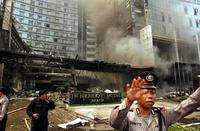-
Rehabilitating historical structures using laser scanning technology
The Carmel Mission Basilica in California is undergoing a restoration using cutting-edge laser scanning technology; earlier this year, engineers the from Blach Construction Company teamed up with CyArk, a non-profit foundation that digitally preserves historical sites, to shoot laser beams at and within the basilica to create precise digital maps of the building from different angles
-
-
Sequestration-related defense budget cuts in 2013 to increase from $50.5 to $60.6 billion

Defense contractors are already worried about $50 billion dollars which would be cut from the defense budget on 3 January 2013 if the White House and Congress fail to reach an agreement on a deficit reduction plan; budget analysts point out that due to a provision in the Budget Control Act, another $10 billion will be added to that amount, bringing the total in defense cuts in 2013 to $60.6 billion
-
-
Water level gauges failed during Hurricane Isaac
As Hurricane Isaac beat down on New Orleans, the damage it caused was nowhere near as severe as that of Katrina, but it lasted longer than most people expected and for the U.S. Army Corps of Engineers, it provided a field test of a multi-billion dollar investment in flood protection
-
-
NIST awards $9 million to promote online security and privacy
The National Institute of Standards and Technology (NIST) last month announced more than $9 million in grant awards to support the National Strategy for Trusted Identities in Cyberspace (NSTIC); five U.S. organizations will pilot identity solutions which increase confidence in online transactions, prevent identity theft, and provide individuals with more control over how they share their personal information
-
-
Mayor suggests student fee to hire more police, firefighters for local college’s sporting events
Morgantown, West Virginia mayor Jim Manilla wants to hire more police officers and firefighters to deal with street fires, riots, and other incidents following West Virginia University sporting events, and he wants the students to pay for it
-
-
Aussie banks considering biometric security
Australia’s major banks are considering a move to biometric security systems in an effort to boost security for their customers; the banks are changing their systems as a way for customers to keep their money and valuables safe without ATM cards
-
-
France intensifies campaign against domestic terrorism
In the wake of police raids in several cities in France, French prosecutors said that an Islamist terror cell was planning the biggest bomb attack on France since the mid-1990s; French police arrested twelve people in raids over the weekend; in one of the raids, a gun-wielding suspect was shot and killed; a French prosecutor said the explosive ingredients found garage in the Paris suburb of Torcy on Tuesday night could have made “exactly the same kind of device as was used in 1995 by the GIA” (the Algerian Islamist group exploded a bomb in the Paris Metro which killed eight people and injured 100); Francois Hollande has said that there will be “total mobilization of the state to fight all terrorist threats”
-
-
Terrorism in Indonesia is on the rise, with different targets

The terrorist attacks at two Bali nightclubs in 2002 killed 202 people and wounded another 240; in the ten years since, Indonesia has gained international praise for its counterterrorism efforts; data reveal, however, that more than 700 militants have been arrested over the past ten years, including eighty-four last year; dozens more have been killed since the Bali bombings; rather than attack Western tourists, Islamic militants now attack the Indonesian government and its agencies
-
-
U.S. keeps collecting money for a nuclear waste repository – but has no plans to build one
Illinois utility customers have paid the U.S government $1.9 billion to store spent nuclear fuel from nuclear plants in the state in a permanent national nuclear waste repository; in the last thirty years, the U.S. government has collected $30 billion from utilities toward this permanent storage, and it keeps collecting $750 million a year; trouble is, in February 2009 the Obama administration decided to “defund” the Yucca Mountain nuclear repository project, and the U.S. government no longer has active plans for a centralized nuclear waste storage facility
-
-
Turkey intercepts a Syrian plane carrying arms from Russia
Tensions between Turkey and Syria continue to escalate, and yesterday Turkish planes forced a Syrian Airbus A320 passenger plane en route from Moscow to Damascus to land in Ankara after Turkish intelligence found that the plane was carrying armament and military equipment Russia was sending the besieged Assad regime; Turkey appears set to create a security zone inside Syria, which will be covered by a no-fly umbrella enforced by the Turkish air force; the no-fly measure would then be extended to the entire Syrian air space, preventing the Assad regime from using its air force to target the opposition, and preventing Iran from air-lifting military supplies to aid the regime
-
-
Rancorous congressional hearings on Benghazi attack marked by partisan rift
The House Committee on Oversight and Government Reform yesterday held hearings on the events surrounding the 11 September attack on the U.S. consulate in Benghazi, and the subsequent handling by the State Department of information released to the public; the hearings were marked by rancor and bitter political acrimony, with Democrats on the committee charging the Republican majority with political grandstanding
-
-
GOP lawmakers advise defense contractors to issue sequestration-related layoff notices
The Worker Adjustment and Retraining Notification Act requires that an employer who employs more than 100 employees must provide a 60-day advanced notice to employees of mass layoffs or the closing of a plant; if the act is not followed, employees can sue for back pay and benefits for up to sixty days; the Obama administration advised defense contractors that they should not comply with the act, even in the face of the 2 January 2013 $500 billion cut in the defense budget which would go into effect if no deficit reduction agreement is reached; if contracts are cancelled and mass lay-offs ensue, the administration said it would cover the defense contractors’ non-compliance-related legal costs; Republican lawmakers say they would block any payments to cover such non-compliance, and advised defense contractors that they should follow the law
-
-
New Jersey “Texting against Terror” program a success
A $5.8 million federally funded program allowing New Jersey Transit commuters to “text against terror” has received 307 tips to the agency since the program started in June 2011; of those 307 messages, seventy-one have “referred to something regarding homeland security,” said Christopher Trucillo, chief of N.J. Transit Police
-
-
Green laser pointer identifies traces of dangerous chemicals in real time

By using an ordinary green laser pointer, the kind commonly found in offices and college lecture halls, an Israeli research team has developed a new and portable Raman spectrometer which can detect minute traces of hazardous chemicals in real time; the new sensor’s compact design makes it a candidate for rapid field deployment to disaster zones and areas with security concerns
-
-
State Department denies concluding attack on consulate was in reaction to anti-Islamic video
Ahead of hearings today before a congressional panel investigating potential security lapses at the U.S. consulate in Benghazi, the U.S. Department of State has said that it had no actionable intelligence about plans by a terrorist organizations for the deadly attack on the consulate; State Department officials also said the department had never concluded that the sacking of the mission was motivated by the U.S.-made video ridiculing Muslims
-
More headlines
The long view
Factories First: Winning the Drone War Before It Starts
Wars are won by factories before they are won on the battlefield,Martin C. Feldmann writes, noting that the United States lacks the manufacturing depth for the coming drone age. Rectifying this situation “will take far more than procurement tweaks,” Feldmann writes. “It demands a national-level, wartime-scale industrial mobilization.”
No Nation Is an Island: The Dangers of Modern U.S. Isolationism
The resurgence of isolationist sentiment in American politics is understandable but misguided. While the desire to refocus on domestic renewal is justified, retreating from the world will not bring the security, prosperity, or sovereignty that its proponents promise. On the contrary, it invites instability, diminishes U.S. influence, and erodes the democratic order the U.S. helped forge.
Fragmented by Design: USAID’s Dismantling and the Future of American Foreign Aid
The Trump administration launched an aggressive restructuring of U.S. foreign aid, effectively dismantling the United States Agency for International Development (USAID). The humanitarian and geopolitical fallout of the demise of USAID includes shuttered clinics, destroyed food aid, and China’s growing influence in the global south. This new era of American soft power will determine how, and whether, the U.S. continues to lead in global development.
Water Wars: A Historic Agreement Between Mexico and US Is Ramping Up Border Tension
As climate change drives rising temperatures and changes in rainfall, Mexico and the US are in the middle of a conflict over water, putting an additional strain on their relationship. Partly due to constant droughts, Mexico has struggled to maintain its water deliveries for much of the last 25 years, deliveries to which it is obligated by a 1944 water-sharing agreement between the two countries.
How Disastrous Was the Trump-Putin Meeting?
In Alaska, Trump got played by Putin. Therefore, Steven Pifer writes, the European leaders and Zelensky have to “diplomatically offer suggestions to walk Trump back from a position that he does not appear to understand would be bad for Ukraine, bad for Europe, and bad for American interests. And they have to do so without setting off an explosion that could disrupt U.S.-Ukrainian and U.S.-European relations—all to the delight of Putin and the Kremlin.”
How Male Grievance Fuels Radicalization and Extremist Violence
Social extremism is evolving in reach and form. While traditional racial supremacy ideologies remain, contemporary movements are now often fueled by something more personal and emotionally resonant: male grievance.
